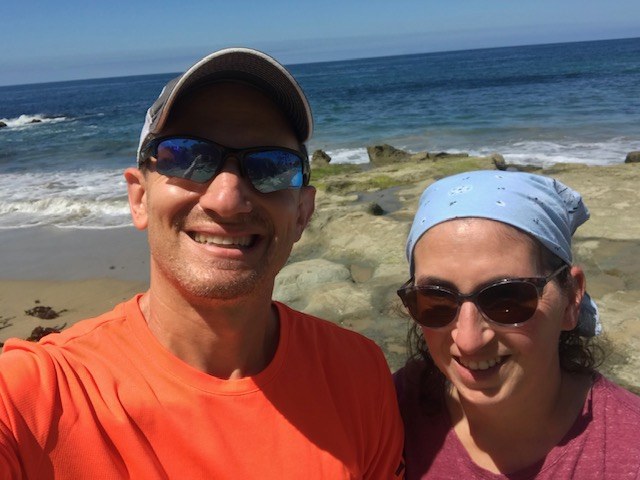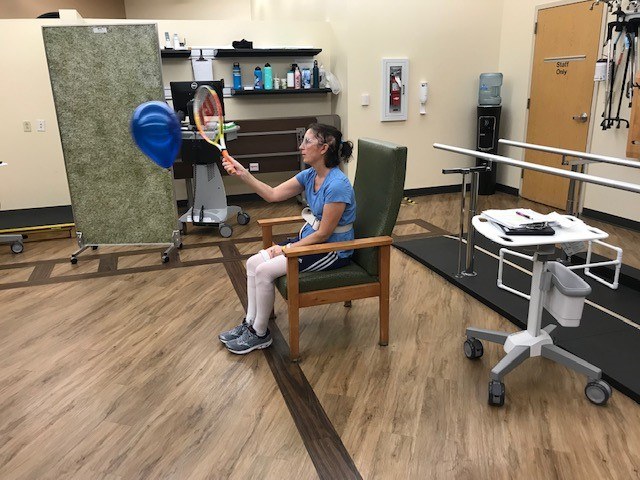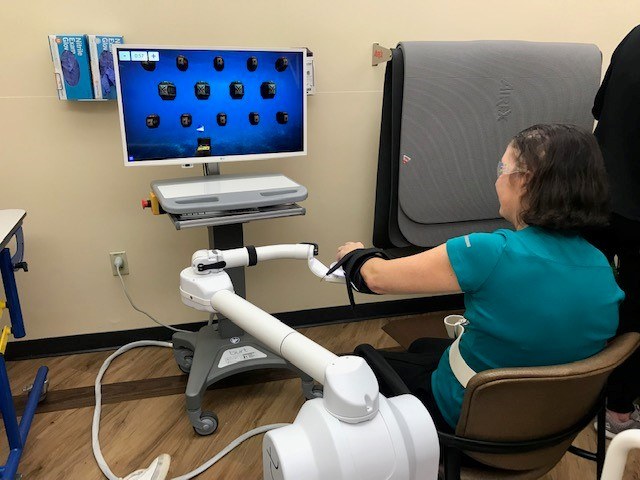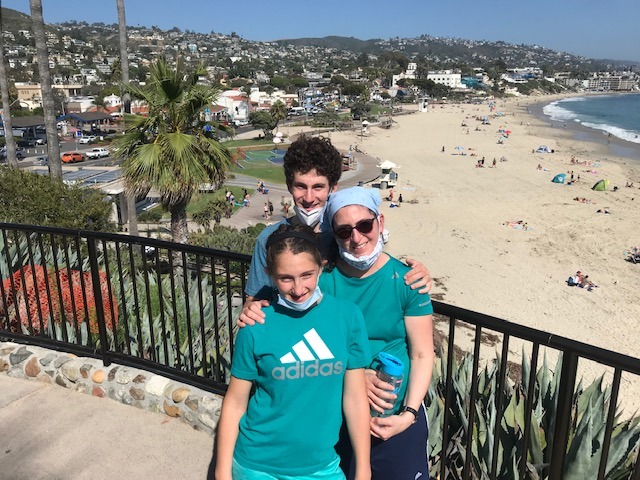
Barrow Patient Finds Purpose in Brain Cancer Journey
When Hillary Burns and her husband, Dan, reflect on her brain cancer diagnosis, they don’t often wonder: Why us?
“Before we could ever think like that, Hillary just said, ‘There must be a purpose to this,’” Dan recalled.
Their journey began eight years ago. Hillary had been feeling low on energy, which her doctor thought might be due to the common cold. Around the holidays, the 37-year-old’s symptoms grew more concerning to her husband of 10 years. Although the symptoms were subtle, they didn’t seem consistent with a cold.
“I think she had what, in hindsight, was a mini-seizure,” Dan said. “Ten seconds where her eyes sort of went vacant, and she kind of snapped back to it after that.”
Dan also noticed that Hillary, who had always been very articulate, wasn’t making sense when she spoke.
A computed tomography (CT) scan in the emergency room and additional diagnostic tests at Barrow Neurological Institute revealed something much more serious than a cold; Hillary had a brain tumor.
A ‘Fighting Approach’
Shortly after receiving the test results, Hillary underwent surgery at Barrow to take a biopsy of the tumor. It confirmed she had a glioma—a type of tumor that arises from the glial cells in the brain and spinal cord.
The tumor was occupying significant space in Hillary’s brain and causing serious inflammation. Experts on the Tumor Board at Barrow and several other institutions all concluded that removing Hillary’s glioma surgically would be too risky; they instead recommended she go straight to radiation and chemotherapy.
Around that time, neurologist Dr. Lynn Ashby returned from a brief hiatus from the field. She disagreed; she felt removing the tumor was necessary and possible at a place like Barrow.
Dan said he and Hillary ultimately agreed with Dr. Ashby’s “fighting approach” and elected to have the procedure. It was a success, with much of the tumor removed and little in the way of functional impairment.
Hillary then underwent radiation and a year of chemotherapy. What remained of her tumor quickly shrank. She, Dan, and their two kids—who were only 4 and 7 years old at the time—moved on with their busy lives.
“Hillary powered through with hallmark courage and perseverance,” Dan wrote in a story published in Medium. “Life with our two young kids returned to a pretty good semblance of normality.”
The ‘Honeymoon’ Ends
But Hillary’s doctors cautioned her about this “honeymoon period.” Due to the infiltrative nature of gliomas, the tumors tend to recur—often with a vengeance.
In the summer of 2019, Hillary visited Barrow for one of her routine imaging scans. She’d mostly been feeling well, albeit a little lethargic. Once again, they thought maybe she had a cold.
Just as they had started to think Hillary might be a miracle and remain tumor free, the MRI scan showed that her tumor had made an aggressive return. This time, it appeared to be a glioblastoma—the highest grade of glioma. Glioblastoma is the deadliest of the tumors that originate in the brain, carrying a median survival time of around 12 months from diagnosis.
Hillary needed another surgery. Within 10 days, she was back in the operating room.
“Hillary Burns stood out in my mind as a very nice, intelligent mother and professional who, unfortunately, had an aggressive tumor in a very bad location,” said Barrow neurosurgeon Dr. John Wanebo. “We performed an aggressive resection last August.”
Dr. Wanebo succeeded in removing the entire tumor. If he hadn’t done so, Dan explained, it would have quickly become problematic again. The extent of the surgery, however, meant that Hillary faced a more challenging recovery this time around.

A Team Approach to Recovery
Hillary remained in the Neuro-Intensive Care Unit for about a week and then spent another four weeks undergoing inpatient neuro-rehabilitation at Barrow, relearning how to walk and talk. She had developed aphasia following the surgery—a language disorder that can make it difficult to find and say the correct words.
Hillary’s memory of her time in the hospital is hazy. She expressed empathy for Dan, who remembers everything much more clearly.
“I felt like I knew a lot about brain tumors from our journey for eight years, but aphasia was a totally new experience,” Dan said. “As I recognized what the aphasia meant and just the recovery path that was in front of Hillary, it was clear to me that she couldn’t do that alone.”
Dan stepped down from his CEO position at his company to focus on the needs of Hillary and their kids.
Hillary continued with neuro-rehabilitation on an outpatient basis. She also needed a second round of chemotherapy and radiation.
“Hillary has done exceptionally well, in part because of her commitment to getting better with regular therapies,” Dr. Wanebo said in December. “As of her last MRI, she is free of active disease 15 months since surgery.”

Continued Progress Through Rehabilitation
Hillary has undergone outpatient rehabilitation since March, aside from two short interruptions to have fluid-draining shunts implanted in her brain. She has participated in the Home Independence Program at the Barrow Center for Transitional Neuro-Rehabilitation (CTN) in some form—either in person or virtually.
CTN offers intensive, day-long treatment through a comprehensive and collaborative approach. Patients have the opportunity to undergo therapy with speech-language pathologists, physical therapists, occupational therapists, and other specialists in one setting. Through CTN, Hillary has also been able to participate in a support group for individuals with aphasia.
“That’s not something we found anywhere else,” Dan said. “The integration is amazing—how the therapists work together. It’s not just siloed by modality. They really combine them around what Hillary needs, and they’re really caring people.”
“What I love is everyone understands that everyone is different,” Hillary added. “For me, it was hard—I couldn’t tell much to them, but they knew that.”
Dan and Hillary learned about CTN from both Dr. Ashby and Cindy Sullivan, a nurse at Barrow and friend of the couple. They credit Cindy with helping them navigate many aspects of Hillary’s care.
“Hillary and Dan’s journey has been absolutely inspirational to me and my family,” Cindy said. “We find Hillary and Dan’s grit and grace a constant source of inspiration to live each day and moment with purpose, love, and absolutely no regrets.”
The Barrow Difference
After Hillary’s diagnosis, she and Dan explored their options around the country to ensure Hillary would receive the best care. They realized they had already found the right place.
“I think we had heard of Barrow (before) but hadn’t really thought about it,” Dan said. “Just to be living in Arizona and to have one of the best places in the world here that we can drive to—“
“We’re lucky,” Hillary added.
Despite Hillary’s difficult road to recovery, she and Dan expressed gratitude that her medical team took on the challenging surgeries. Without them, Hillary might not be here today—actively participating in everyday life with her family.
“They did it in a very thoughtful way, knowing Hillary’s specific case, and I think that’s why—eight years later—she’s here doing as well as she’s doing.”
Finding Joy and Purpose
Dan said their children, now in 7th and 10th grades, have shown amazing resilience and have each stepped up in their own way to support Hillary and help him around the house.
“We’re very honest with them, but we share the level of information that they’re ready for and that they’re seeking,” Dan said. “We try not to inundate them with it, and we’ve also tried to keep their lives as normal as possible.”
The Burnses recognize the seriousness of Hillary’s condition and face it with a necessary dose of realism.
“But at the same time, we don’t let that make us fatalistic,” Dan said. “We feel like there’s still a lot of fight ahead of us.”
They focus on living in the moment and taking life one day at a time. They try not to worry, which Dan says only robs them of finding joy in the present.
“We know that what’s behind us has been hard, and there will be more of that ahead of us,” Dan said. “We’ll cross those bridges when we come to them. There’s so much that’s full in our lives.”
They share this philosophy with others, whether it’s loved ones struggling with the uncertainty of the pandemic or other families coping with a brain tumor diagnosis of their own.
“Over the course of eight years, at least five to 10 people have been diagnosed with brain tumors who are one degree of separation from us,” Dan estimated, with Hillary nodding in agreement.
He said Hillary has embraced the opportunity to share her experience and perspective with them.
“That’s given us a purpose,” he added. “We don’t really ever look back and say, ‘Why us?’ In some ways, we say maybe it’s a blessing that we can use this to impact others positively.”

